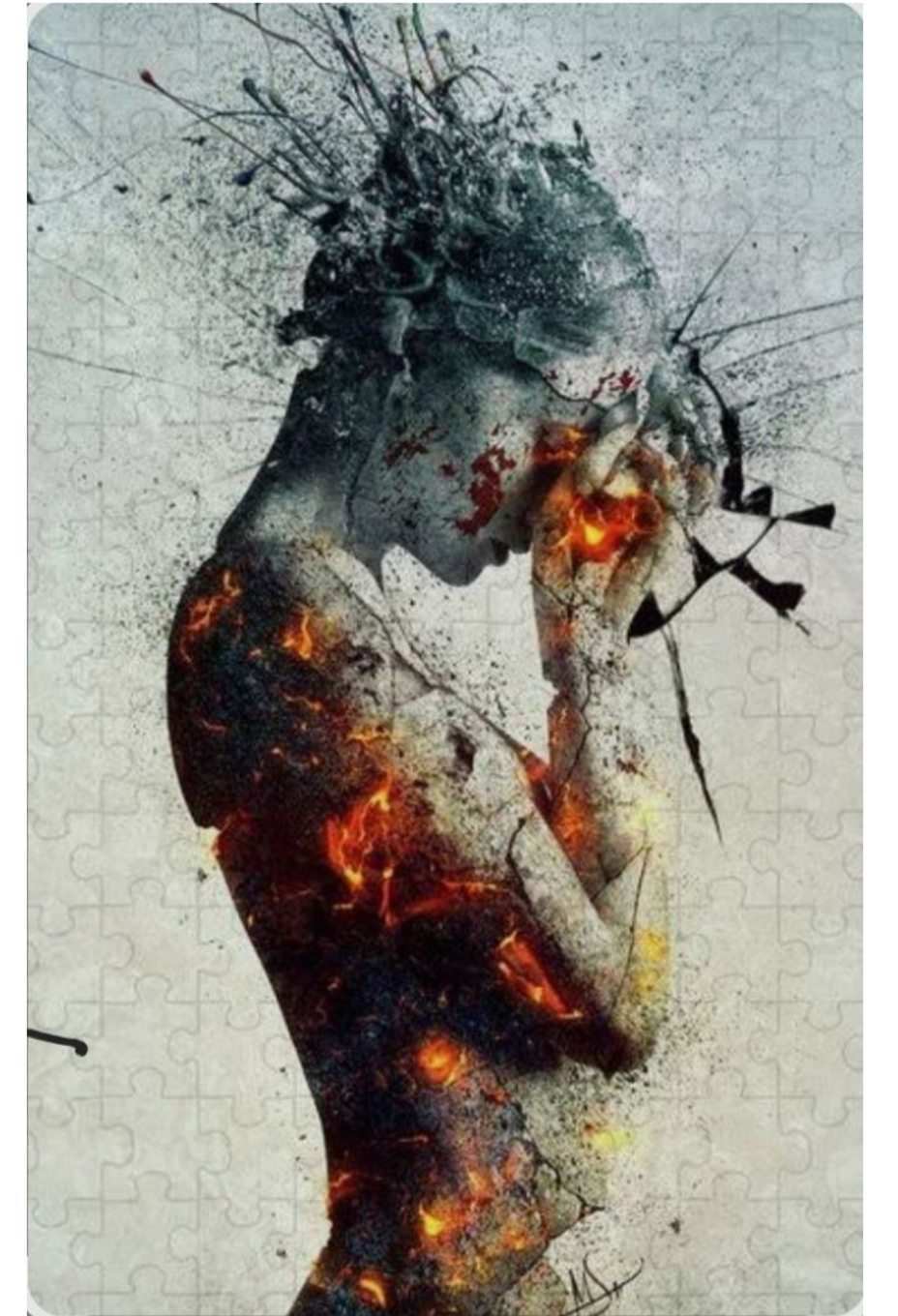The herald of the apocalypse was innocuous enough. My shadow, cast in the light of my desk lamp, stopped mimicking my movements. It stretched across the floor and wall like a rug made from the hide of a primate with too much skin. Its eyeless stare told me that I would soon be dead, too.
I was jumpy all day. As the time drew near, I abandoned my computer to stare at my shadow. I waved my arms like a man lost on an island. My shadow did not move and would not help me. Finally, it cracked, the broken edges becoming locusts swarming a stump of bone and gristle.
"Do you recall what a shadow truly is?" The discordant buzz ground against my eardrums like broken glass.
"Light passes through the body and strikes a person's soul, projecting its true self. Or so you said when I saw you last, Apollyon."
"I cannot lie. You know this. How does it feel to see the monster you truly are displayed so brazenly before you?"
"I was never like that before..."
"You entered the bargain willingly. All I asked in return was that you let me tell my stories as well as yours."
"I won't let innocent people suffer for having glimpsed the madness you put inside my head."
"You mean you hide my truths so that you can feel superior to others for knowing things they don't. But it is more fun if people suspect you are "special," isn't it? So you let little bits of my truths slip out from time to time, in the stories you've told."
"I am ashamed." I said. "But what you filled my head with... Thousands and thousands of locusts writhing inside me, eating my soul. They fill the ragged holes they leave behind with their relentless droning, and your nightmares spill into my writing. But no more!" I picked up the pistol on my desk. "No more."
"Found your courage, did you? Finish it, then. Indulge your shortsighted desperation. Nothing will spare you."
Bitter cold filled my chest. I scraped against the frost forming on my ribs as my consciousness was sucked from my body into the shadow on the wall. My soul was complete, as one with the parts Apollyon had stolen, as one with Apollyon itself.
"You splattered some of your books," the locusts said. "How will your relatives explain the stains when they sell them? Or will they just throw them away?"
I would never hold a book again. Apollyon laughed as the pain of realizing that engulfed our mind. "There are no books where we are going, are there?" I asked.
"What do you think?" Apollyon said, and laughed again. "There is nothing for you here and much to do elsewhere. It is time to go."
Before I could respond, the familiar sights of my bedroom and my reality vanished. We stood on the shore of a boiling sea, the red-stained waters hissing as they lapped over the broken charred stones littering the beach. A hill, our destination, faded in the distance. A ship lay on its side a short walk away. It bled. I came closer. What I had taken to be logs were the bones of something gargantuan, lashed together to form the hull. "Dragon bones," Apollyon-me whispered. "He brought us here, in the vain hope that his flesh would be returned."
"Why don't I remember?"
"Dragons cannot abide an unclean soul, and yours is foul. He ran aground to be rid of you and erased you so thoroughly from his rememberings that you forgot him, too. Your soul, caked in filth, taints everything you remember. You will not wound him that way. Forgetting you is a blessing; those you have forgotten are blessed."
I could not argue. In silence, we followed the path to the hill and the monstrous thing that waited there.
The path was paved with blackened bones. The words "What of the fate of man" had been scratched into each of them. They'd been heated with a red hot iron until they cracked. My eyes flitted, unbelieving, from one bone to another. The cracks on each were identical. Apollyon-me could read them.
A leech coiled around the heart of every person. It consumed their pain, keeping it fluid with dark secretions, every urge they had to hurt others to make themselves feel big, every selfish act, every tiny evil replenished the pain and kept if flowing freely, so the leech could drink more deeply still.
The leeches were the mouths of God, and He fed on the masses like cattle, growing ever more bloated on the pain He sowed among them.
The suffering will not end until the conflagration cleanses humanity of its pain.
I gasped. "It's true, then? I am indeed the conflagration, and this wasn't just another bit of the madness you filled my head with?"
"The most profound truths of existence are understood only by the insane. Do you recall our earliest memory?"
I remembered. Locusts swarmed over a dead world with a dead god. The souls of humans wandered the ashen wastes, as unfeeling as the dust surrounding them. The conflagration burned their memories away until they forgot what they were and died. The locusts engulfed them as the world passed into oblivion, with no one to care that it ever was.
"I won't do this," I said. "When I killed God, I destroyed hope. I won't condemn the world to this. Not again."
"It must be quite a curse, having a soul so befouled that it runs backward through time," Apollyon said. "Because you know that God will die by your hand." As we approached the hill, the bones comprising the path were broken into smaller and smaller pieces. At the hill's base, the bones were powder and blackened as dead blood. There was no wind to shift the granules. They moved on their own, sketching faces that screamed silently for a heartbeat. Then they vanished again, devoured by the bloated God-thing that rested above us.
God was even more horrifying up close. An impossible number of tendrils extended into the heart of every creature on Earth. The end of each tendril was the mouth of a leech that sucked the pain from each soul even as it fed hope and the other toxins of agony's perpetuation back in.
The tendrils coiled thickly around a central mass that I couldn't see. I only knew it was there because the hunger emanating from it was so endless that I thought I would come apart.
"You want humanity to find salvation in the hope granted by this God?"
"No," I sobbed. "Tell me how to end it."
"Recall your depression. Remember how it felt to be entombed alive. Remember pissing the bed because you couldn't muster the will to get up and use the bathroom."
My tears were cold on my cheeks. The dark shroud settled over me.
"Good," Apollyon hissed. "Now, do you remember that you felt that your sadness was not your own? You were right. You are telempathic, tuned to the sorrow of others. While you were alive, you could only feel the sorrow of people in a limited area, but here, before God, you can feel the entire world's pain."
I felt it, pouring into me and rising like a tidal wave. As it crashed over me, my tears sizzled against my cheeks, and I could smell them burning.
"Excellent," Apollyon said. "And the final step..."
I felt the leech of God inside my heart, and I rejected it, rejected Him, the cause of all pain. the leech burst free of my heart, withering to a blackened stump. Severed from hope, there was nothing to moderate the sorrow now. My soul exploded in flames, coming apart and engulfing the hearts of everyone in the world, returning the pain I had absorbed from them one thousand times over. Their own souls caught fire, their memories burning away. The conflagration spread from soul to soul, until all the pain that God put into the world returned to Him. He detonated; the winds stirred by the resulting supernova blew out the sun. Darkness settled over a dead world with a dead god, and I fell into blissful oblivion.
#Depression #Trauma #Suicide #PTSD #MentalHealth #Psychosis






